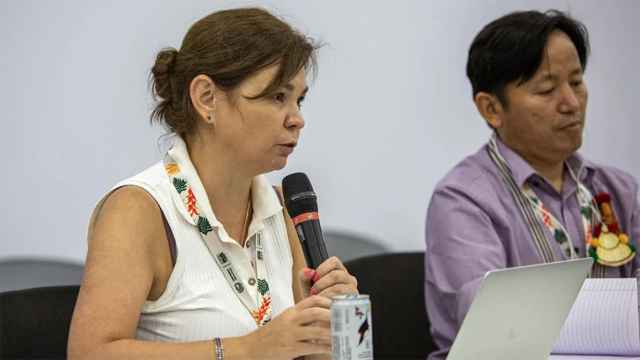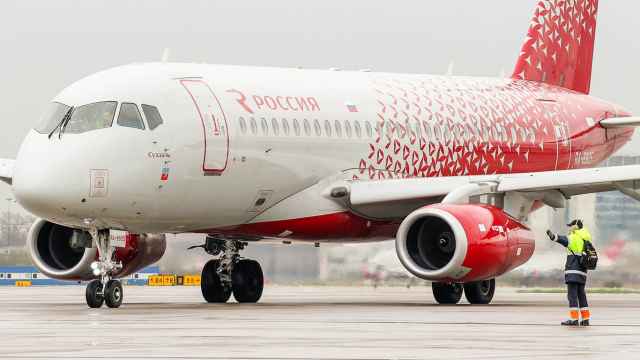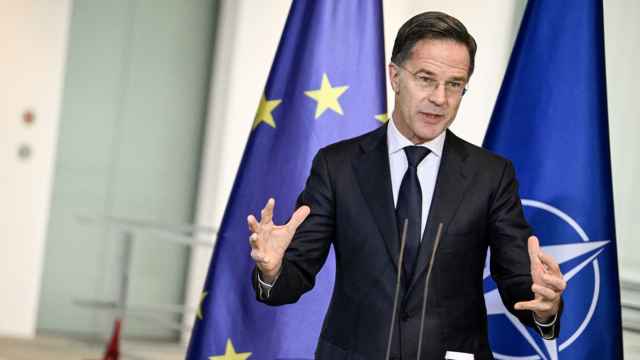While rising internal political risks in Russia have grabbed the spotlight, the most serious economic threats are external, and a shock would complicate Prime Minister Vladimir Putin's bid to return to the Kremlin.
The country is showing economic resilience amid international financial turmoil, which it is better able to withstand than in the past. But contagion effects from the euro zone threaten an already shaky recovery through weakening exports and capital flight as banks cut exposure to Russia.
If the euro zone does not get its house in order and an economic slump leads to a sharp and sustained drop in oil prices, Russia will feel much more than a chill.
"Europe is extremely important for Russia," said Vladimir Tikhomirov, chief economist at Otktitie Securities in Moscow.
"The consensus is that the euro zone will manage to muddle through. But the reality is that we're being gradually dragged into a crisis that could become deeper and deeper."
So far, Russia's economy, which is expected to grow by about 4 percent in 2011, has shrugged off the euro-zone blues. But it has been helped by temporary factors, including a much-improved harvest and a boost in election-related expenditures.
Most economists anticipate slower growth next year. In its most recent economic forecast for Russia, the International Monetary Fund anticipates "subdued" growth of 3.5 percent, with "significant downside risks."
Even a relatively modest downturn will be highly unwelcome for Putin's government — now facing open public discontent driven in part by disappointment over living standards. A harder landing could be in store if the fragile situation in the euro zone deteriorates further.
Whatever the endgame, Russia can hardly ignore the fate of the euro. Out of its $514 billion in foreign exchange reserves, 45 percent is invested in euro instruments, mostly sovereign debt.
The European Union also accounts for 50 percent of Russian exports, which would be hit in the event of a euro-zone slump.
In the nightmare scenario — bank runs, sovereign defaults and even a breakup of the single currency — Russia would inevitably be caught up in the general panic.
"There would be a significant decline in sentiment and a massive flight to quality," said Alexei Moisseev, head macroeconomist at VTB Capital. "All investors, Russian included, will just sell the ruble and buy U.S. Treasuries."
For now, most Russian analysts assume this nightmare can be avoided. "I don't think there will be a major impact on Russia unless something catastrophic happens, such as a complete collapse of the financial system," said Yevgeny Gavrilenkov, chief economist at Troika Dialog in Moscow.
Crucially, the oil price — now hovering close to $110 a barrel — has been holding up. Its resilience is a sign of Europe's relatively minor role in influencing oil demand, which is driven by continuing rapid growth in Asia.
Members of the OPEC oil export cartel, many struggling with their own domestic discontent, now more than ever share Russia's interest in keeping oil prices at historically high levels.
Nevertheless, a serious deterioration in the euro zone would ultimately have knock-on effects on demand in emerging markets.
"The crucial question for Russia is not the direct impact, but whether the European crisis becomes big enough to have an impact on China," said Jacob Nell, chief economist at Morgan Stanley Russia.
While most analysts see a fall in the oil price as the primary risk, Russia also has other forms of contagion to fear. In the last crisis, the cutting off of international funding for Russian banks and companies, many with short-term debts to repay, greatly exacerbated the severity of a slump in which the economy shrank 8 percent in 2009.
Russian companies and banks, which borrowed an additional $48 billion from abroad in the first half of 2011, slashed external debt by $17 billion in the third quarter.
"The strongest sign I see of the European funding stress on the Russian economy is the fall in external debt. That's a big number," Nell said.
Analysts nevertheless see the risk of financial contagion as milder than in 2008-09.
Whereas in the previous credit crunch a third of Russia's private external debts had a maturity of less than one year, that figure today is about 10 percent. Russian banks, which had net foreign liabilities of $100 billion in 2008, have since become net international creditors to the tune of $45 billion.
Another reason for optimism is simply the fact that, compared with the huge swings in investor sentiment seen in previous crises, Russia has less room for deterioration.
"It's hard to expect too negative a surprise because capital outflow — about $7 billion a month — is already very high," said Natalia Orlova, chief economist at Alfa Bank.
But that is rather cold comfort for a country already facing relatively low levels of investment and a long-run decline in economic growth, attributed by most analysts to problems such as legal uncertainty and high corruption.
Fix that, and Russia should attract capital seeking higher returns than those available in stagnant European economies, argued Sergei Guriev, dean of Moscow's New Economic School.
"It's the investment climate in Russia that is the problem rather than the European recession," Guriev said.
A Message from The Moscow Times:
Dear readers,
We are facing unprecedented challenges. Russia's Prosecutor General's Office has designated The Moscow Times as an "undesirable" organization, criminalizing our work and putting our staff at risk of prosecution. This follows our earlier unjust labeling as a "foreign agent."
These actions are direct attempts to silence independent journalism in Russia. The authorities claim our work "discredits the decisions of the Russian leadership." We see things differently: we strive to provide accurate, unbiased reporting on Russia.
We, the journalists of The Moscow Times, refuse to be silenced. But to continue our work, we need your help.
Your support, no matter how small, makes a world of difference. If you can, please support us monthly starting from just $2. It's quick to set up, and every contribution makes a significant impact.
By supporting The Moscow Times, you're defending open, independent journalism in the face of repression. Thank you for standing with us.
Remind me later.





